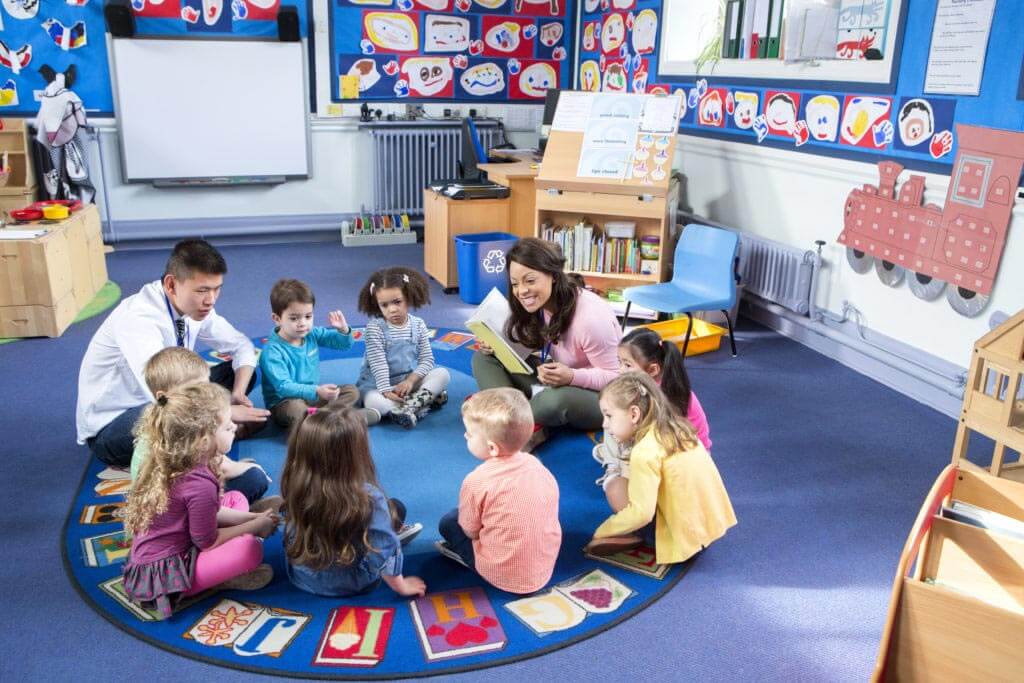This weeks skills:
Nursery activities such as circle time help children build their social skills. These fun yet engaging games encourage learning in a structured setting. Good communication, language, and literacy skills which are developed at a young age directly correlate with positive outcomes later on in education. These language skills are fundamental in allowing a child to access the rest of the curriculum. They promote social skills and help children build relationships as well as improving their confidence and self-esteem.

Applying language and communication in the classroom
In order for children to fully understand how to apply these skills, activities such as circle time provide the structure that helps children build their skills around and that all children have the opportunity to get involved. Circle time is often viewed as special as it is considered time off from the academic curriculum.
Circle Time Games & Rules
Often, teachers will mix ‘typical’ circle time with other activities. These will keep the children entertained and engaged whilst still actively learning.
- Simon Says is a game that helps children learn to listen and concentrate
- Musical Games are often used to get children to try coordinating with a certain beat or rhythm whilst keeping them entertained. Many circle time songs will incorporate movements and noises such as clapping, standing up, sitting down and animal noises to get children to interact with the lyrics and each other.
- Talking Ted involves passing a toy around the circle and whoever has the toy gets to share something. Teachers will often use this as an opportunity to get children to understand their emotions, getting kids to share stories from a time they’ve felt a certain emotion.
- Imagination Games can be used to get children to think creatively, things such as making up stories one word at a time, replicating animal noises can help children create links between listening and speaking.
- Cool-Down Games are helpful to transition kids back into a learning headspace and can involve getting them to freeze on the spot and slowly ‘melt’ to the ground.
Typically, circle time follows a loosely based structure, this allows the teacher to have some control over who is speaking and can allow everyone to take a turn. Children are often involved in deciding what the rules are, allowing them to fully understand what those rules are. Common circle time rules are:
- Putting hands up to speak
- No interrupting each other
- Allowing children to ‘pass’ if they don’t want to speak
- Taking turns
- Valuing all contributions and not putting anyone down
The importance of teachers
Perhaps one of the most often overlooked aspects of circle time is the teacher’s involvement. Circle time gives teachers a better understanding of the lives of the children in their class, and what problems they may be facing. Having the children being able to share openly with the other children as well as the teacher creates a bond with the group as a whole. This can have more of an effect than one on one or individual activities because there are social skills that are being developed in the background. Most often, practicing circle time on a regular basis is what makes it most effective.
Benefits of circle time as a whole
Circle Time has many benefits for children as individuals and their schools. These include:
- Improved speaking and listening skills.
- Increased self-esteem.
- A sense of community.
- An understanding of how their behaviour affects others.
- Improved emotional intelligence.
- Improved problem-solving skills.
- A sense of responsibility.
- Improved relationships between children, and between children and their teacher.
The benefits are neatly summed up by an extract from one OFSTED report:
‘The weekly circle time for each class enables pupils of all ages, at their own level, to reflect on aspects of their lives, to discuss moral and social issues and to express with confidence their understanding of right and wrong and their sense of justice. Pupils learn to listen to others, to be tolerant of other viewpoints and to respect fellow pupils.’

Involving children with SEN into circle time
Pupils with special educational needs are helped by the inclusivity of circle time alongside the practice of social skills; without these things, children can develop persistent problems later on in life. Circle time provides an atmosphere to work together, based on understanding and awareness, and respect for the difference in others, their values, and beliefs.
Whilst difficult, circle time can still be beneficial for young children with autism because it requires social proximity, participation with peers in a group activity, receptive language skills, understanding of abstract concepts (e.g., calendar, weather), and sustained attention. Circle time can provide predictability and consistency if held at the same time every day, in the same location, with similar activities.
Subscribe to receive expert advice and tips from seasoned professionals in the early years sector.